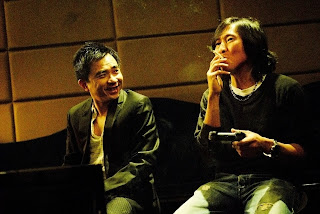Taiwan Film Days (TFD), the only yearly Taiwanese film festival in the States, opened its three-day program on November 1. Hosted by the San Francisco Film Society (SFFS), this year’s line-up included the island’s hit, Zone Pro Site: the Moveable Feast and seven other films.
Three filmmakers were also on hand at the 5th TFD to attend their film’s Northern California screenings and to participate in the Q&A which followed. They included Hou Chi-jen, director of When a Wolf Falls in Love with a Sheep, Hsieh Chun-yi, director of Apolitical Romance, and Mimi Wang, producer of Ripples of Desire.
Starting from Cape No. 7
Since 2006, the Press Division of the Taipei Economic and Cultural Office (TECO) in San Francisco has worked with major Bay Area colleges and universities to hold the Taiwan Film Festival. During certain years, the program would extend to campuses in Utah, Nevada, Washington and Oregon. But, given the division’s limited staff and the extensive multi-state and campus coordination needed, the concentration shifted to partnering with the San Francisco Film Society and localizing the festival in the Bay Area.
In 2009, Manfred Peng, the new press director of TECO, began discussions with Graham Leggat, the then executive director of SFFS, regarding organizing an annual Taiwanese themed film festival. Leggat, both personable and an avid supporter of Taiwan films, agreed to organize a festival and Taiwan Film Days was born.
Founded in 1957, the SFFS holds the annual San Francisco International Film Festival, the longest-running international film festival on the West Coast. Each May, this highly competitive festival screens a selection of 150 films from around the world. SFFS, a proponent of Taiwanese cinema, has played a pioneering role in introducing Taiwan-made films to Bay Area audiences. Its San Francisco International Film Festival has shown over 40 Taiwanese films over the years. Works by leading figures—Hou Hsiao-hsien, Tsai Ming-liang and Edward Yang—have been featured, and prominent actor Lee Kang-sheng was a Festival guest in 1998.
With SFFS’s track record and its extensive mailing list of Bay Area film lovers, this collaborative effort allowed TECO to reach further off campus. Not only was the SFFS a prestigious and trusted institution, its staff members were also well-connected to the American film industry, giving visiting filmmakers from Taiwan a chance to learn more from their host. Also, since the films were selected by a third party with a sterling reputation, the films were given more legitimacy.
Five years ago, Taiwan’s movie industry also underwent a revival with the introduction of Cape No. 7, a local blockbuster. The first Taiwan Film Days was born in the wake of this Taiwanese film renaissance. Through the selection of SFFS, Cape No. 7 and six other newly produced feature films and documentaries tested the American market by selling tickets at movie theaters in San Francisco. The box office result of the three-day festival was good enough that Leggat renewed the festival for the next year. It is now a part of the SFFS fall program, along with more well-established festivals such as French Cinema Now and New Italian Cinema.
SFFS, seasoning Taiwan’s filmmakers
Most of Taiwan’s film companies are small, lacking in foreign language talent and international experience. In order to broaden the visiting director’s experience, SFFS would invite some directors of the participating films to meet American audiences, filmmakers, teachers and students at participating film schools. This allowed the visiting filmmakers to gain a better understanding of the US market.
Since the inception of the Taiwan Film Festival and Taiwan Film Days by the Press Division, it has welcomed more than 50 Taiwanese filmmakers/producers and screened over 70 movies since 2006. As a result, San Francisco has become the “launch pad” for Taiwan filmmakers to test how their movies will translate to an American market.
In 2012, when Taiwanese blockbuster Warriors of the Rainbow: Seediq Bale was screened at cinemas in the US, the box office in the Bay Area took top place among major US cities. In part, this can be attributed to the long-term marketing and steady cultivation of the local audience by TECO for Taiwan-made films.
Since the launch of Taiwan Film Days five years ago, many have come to known Leggat. When he passed away in 2011, Taiwanese directors joined a vast numbers of international directors in expressing their condolences. Since then, two subsequent executive directors have also renewed their support for Taiwan Film Days, with the festival growing each successive year. Inspired by the success of Taiwan Film Days, Hong Kong has also followed TECO’s model by holding its own festival in cooperation with SFFS starting 2011.
A useful tool to promote soft power
Movies have become a tool for Taiwan’s diplomatic offices overseas to promote Taiwan’s soft power. Since the 1990s, Taiwan’s films have steadily appeared in international film festivals, promoting the international appeal of Taiwanese directors. Taiwan’s films showcase the island’s way of life in a manner that is easily assimilated into the general consciousness. And, film screenings required little overseas personnel and are not cost prohibitive to stage, unlike other forms of performing arts or exhibitions.
In October 2010, TECO held Taiwan Film Days as scheduled. About the same time, the Chinese Film Festival opened in San Francisco, screening the Founding of a Republic, one of the most costly films ever to be made in mainland China. In a review of the two festivals, San Francisco Chronicle commented that the two sides of the Taiwan Strait held their respective film festivals, but there were big differences between the topics of their films. “Mainland China makes films with a collective bent and Taiwan makes smaller, more independent and individualistic movies,” the article noted. Along with the review was a poster of Taiwanese film Somewhere I Have Never Traveled, directed by Fu Tian-yu. Fu and other directors invited to attend the screenings of TFD were proud to read that comparison.
An American couple was asked about their loyal support of the festival, buying a book of tickets and watching almost every film screened each year. What accounted for their enthusiasm for Taiwan films? The wife responded that her father was a missionary in mainland China and that is why she is so fond of Chinese culture. She believes that Taiwan’s movies highlight social issues and the humanitarian spirit, which is not seen in most mainland Chinese movies.
Ministry of Culture takes over film promotion
As a city with a high concentration of different ethnicities and cultures; San Francisco is a wonderful venue for TFD. Asians alone account for 30 percent of the city’s population. By and large, the city’s demographic is highly educated, well-traveled and economically comfortable, making it a fertile ground to promote Taiwan’s soft power.
Up to 1,500 people attend the festival each year, with half of them being ethnic Chinese or Taiwanese. And of that segment, half of them are American-born Chinese (ABC). They do not understand Mandarin, but are more economically and politically tied to America. This also is a particularly good group for TECO to nurture since they are also culturally tied to Taiwanese and Chinese culture – or would like to be – yet wield certain influences in the States. An example can be seen during the Q&A session of last year’s Joyful Reunion, when an English speaking ethnic Chinese writer complimented director Tsao Jui-yuan, saying that Tsao’s work gave her a better understanding of Taiwan.
This year, the main sponsor for the festival came from Taiwan’s Ministry of Culture (MOC), a newly formed government agency charged with promoting Taiwan-made films. In previous years, the festival’s main collaborator was the Government Information Office (GIO). However due to restructuring in the Taiwan government, the GIO was disbanded in 2012 and most of its work shifted to the MOC or the Ministry of Foreign Affairs (MOFA). Since TFD is the only festival dedicated to Taiwan-made films in the States, the MOC is committed to continuing and growing the festival from their office in Los Angeles.
Many challenges for Taiwan films to break into US market
Each year, Peng and SFFS’s programmers, Sean Uyehara and Rachel Rosen, have sifted through Taiwan’s most recent films, narrowing it down to 20 to 30 films to watch. Once selected, Peng watches the selected films at the festival screenings again. In total, he has watched almost 150 Taiwan movies in the past five years, in addition to repeatedly watching certain movies at smaller venues throughout the Bay Area. With his clear mandate to promote Taiwan-made films, he had never watched so Taiwanese many movies before arriving in the States. Because of this, “Colleagues at other overseas offices have asked for my opinion. I’ve become a semi-professional movie critic, giving recommendations on which films are good to screen at the festivals.” Although Peng happily promotes the movies selected for the festival, he also has a sharp eye for movies that do not make the festival, but are noteworthy. One such film is The Soul of The Bread. Going on his personal instincts, Peng started promoting the light-hearted romantic comedy locally. It soon became a popular audience favorite throughout the Bay Area.
Peng said, “Working to promote Taiwanese films in America, I feel I have kept up with the growth of Taiwan’s film industry. My attitude has changed from being indifferent to one of enthusiasm.” Because of his work, he noted the following challenges for Taiwanese films in entering the US market.
Since the late 1980s, a number of new Taiwanese directors have focused on targeting the metropolitan middle class, catering to international film festivals, and not to Taiwan’s domestic market and the Taiwanese taste. However Cape No. 7 changed all of that. It reversed the direction of Taiwan’s producers, turning their eyes to the underlying theme of uneducated characters in the country side. Coupled with the Taiwanese government’s subsidy based on box office receipts, Taiwan’s filmmakers have readily turned to the domestic film market to seek topics and style, Peng said.
Ten years ago, Taiwan-made films accounted for only 3 percent of the total revenue of the island’s theaters. It now stands at 18 percent as of last year, showing a surge of people going to theaters to watch locally made films. With commercial viability of Taiwan-made films realized, movies have been targeting Taiwan’s young adults, who are the largest consumer segment for films. Recent film plots have included first love, encouraging stories of perseverance and hard work, youthful rebellion into crime, and stories centering on the lower middle class society found in night markets and rural villages, to the marginalized in Taiwan. Peng said it is rather difficult to select six to eight different styles of movies to reflect the different plotlines or not to repeat them during the festival.
Cultural divide still a barrier
Although movies are a universal language, the cultural barrier is still a difficult divide to overcome. It is not easy to attract Americans to spend half a day in a theater watching foreign movies. American theaters only screen a handful of non-English films throughout the year, mainly French and Italian movies. American television channels also rarely play Asian movies. This is the reality that TECO faces in promoting Taiwanese films in the US.
Furthermore, Taiwanese film budgets are far less than that in Europe or America, and usually lack a superstar cast or dazzling special effects. The key for Taiwanese films in standing out is the script. Like the US, there are many instances where a low cost indie film succeeds at the box office by touching on topics or stories that resonate with an audience.
Given this handicap, it is natural for Taiwanese films to localize its subject. However, by localizing the humor, storytelling and centering on Taiwan’s lower middle class, much of the meaning is lost in translation. And if you need to explain a joke, it’s not funny. After watching Din Tao, a very popular Taiwanese movie at TFD last year, some of the American audience were confused by why such a group would want to carry the load of a heavy puppet while traveling around the island, or even climbing the mountain?
After Edward Yang and Ang Lee
Last year, the SFFS specially screened A Brighter Summer Day, directed by Edward Yang, which was the only non-current film shown since the establishment of TFD. Peng was originally dubious of its attraction, since the movie was more than two decades old. But to his surprise, it played to a full house with the vast majority of the audience being non-Asian. It was a testament to the quality of the film since its running time is nearly four hours, and no one seemed bored or left early. At the invitation of the festival, Edward Yang’s widow Peng Kai-li also came to the screening and was deeply touched by the film’s reception. The packed house renewed TECO’s hope about marketing Taiwanese films to a US market.
In recent years, Taiwanese films have moved from “international” to “localization”, which seems too narrow in terms of topics for overseas film festivals. International selectors at festival films are fully aware of each work by Hou Hsiao-hsien, Edward Yang, Tsai Ming-liang, and Ang Lee. However, after a decade, will there be another group of new directors to carry on Taiwan’s cinematic banner in the international arena? Will the next classic hit at a prestigious international film festival be plucked from the screening list of TFD, asked Peng.
After enjoying the resurgence of its domestic box office, Taiwanese filmmakers need to assume the responsibility of taking Taiwanese films to global audience by telling stories that will captivate the hearts of an international audience. After all, Taiwan’s film industry is no longer as unseasoned, with local government assistance and overseas offices standing ready to help. And given Taiwan’s stature, it still remains the best tool to demonstrate Taiwan’s soft power worldwide.











